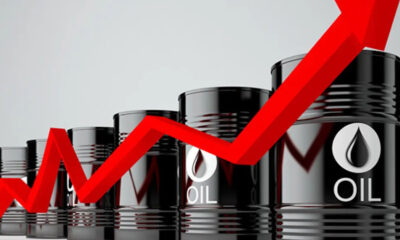Business
Nigeria’s crude oil exports hit three-year low, says report

West Africa’s oil exports slumped to the lowest level in at least three years last month as infrastructure woes for some of Nigeria’s biggest streams combined with gradually waning output in Angola.
Combined flows from the region fell to 3.41 million barrels a day in January from 3.8 million barrels a day in December, according to tanker-tracking data compiled by Bloomberg.
It was the lowest for both countries since January 2018, when Bloomberg started monitoring shipments in detail.
The report came just as Minister of State for Petroleum Resources, Chief Timipre Sylva, has said that with the completed and ongoing modular refineries in Nigeria, the Federal Government is set to tackle unemployment and incessant pipeline vandalism.
Nigeria, West Africa’s biggest oil producer, has seen its shipments curtailed in recent months by infrastructure issues affecting its biggest crude streams.
The nation’s loadings fell to 1.37 million barrels a day in January, the lowest for four years, according to separate data based on loading schedules compiled by Bloomberg.
Exxon Mobil Corp.’s Qua Iboe stream was placed under force majeure until late January following a fire in mid-December at the grade’s oil export terminal.
Revised loadings of Qua Iboe slumped to about 61,000 barrels a day over December and January, the lowest rate in more than four years while liftings averaged 190,000 barrels a day last year, the loading data show.
Nigeria’s Brass crude flows also slumped as shipments were rescheduled following pipeline problems late last year.
Eni SpA lifted a force majeure, a clause in contracts that allows deliveries to be suspended, on Brass exports in mid-December following repairs of two pipelines that lead to the Brass oil terminal.
Exports of Royal Dutch Shell Plc’s Forcados crude, the nation’s biggest oil stream, were also briefly placed under restrictions last month after a pipeline for that facility experienced leaks, although crude flows weren’t fully halted.
However, according to Bloomberg, Nigeria’s export problems may be temporary, as infrastructure is repaired and oil flows are restored.
However, it stated that Angola’s dwindling outflows look symptomatic of a longer-term decline in the country’s oil output.
Africa’s second-largest oil producer shipped 1.05 million barrels a day last month, slumping from an average of 1.25 million barrels a day last year, the tanker-tracking data show.
When Angola joined the Organisation of Petroleum Exporting Countries (OPEC) in 2007 it was pumping about 1.5 million barrels a day and output was rising as a string of new deepwater discoveries were brought into operation by companies including Total SE, BP Plc, Eni and Chevron Corp.
At the time, Angola said it would accept an OPEC production quota once its output hit 2 million barrels a day, a level that it struggled to reach on a sustained basis before a steep decline in rates as its offshore fields began to exceed the pace of additional supplies from new discoveries.
Linking smaller satellite fields back to existing floating production units helped the country to keep production close to its two million barrel-a-day target for several years, but declines really began to set in from the beginning of 2016, when the stock of new fields available for development began to dwindle.
Meanwhile, the Minister of State for Petroleum Resources, Sylva, has said that with the completed and ongoing modular refineries, the federal government is set to tackle unemployment and incessant pipeline vandalism.
Sylva spoke during the ground-breaking of an energy infrastructure park being developed by Atlantic International Refinery and Petrochemical Limited in partnership with the Nigerian Content Development and Monitoring Board (NCDMB) at Okpoama, Brass Local Government Area, Bayelsa State.
A statement by the NCDMB in Abuja noted that the minister also inaugurated three corporate social responsibility (CSR) projects executed by the company.
The projects included the Okpoama Cottage Hospital, Iseleama Health Centre and Okpoama Community Water Works. Sylva added that one of the best strategies to curb restiveness in the Niger Delta region is to create jobs and opportunities for youths.
He listed part of his mandate to include collaborating with players in the private sector to establish oil and gas facilities, including modular refineries, which will ensure value addition to the crude oil, products sufficiency, create jobs in-country and curb pipeline vandalism.
He charged the people of Okpoama and other parts of the Niger Delta to create an investment-friendly environment that will attract other oil and gas and manufacturing facilities to the region.
Executive Secretary of NCDMB, Mr Simbi Wabote, listed the various elements of the energy park project to include 2,000 barrels per day modular refinery, a power plant and a jetty.
He added that the project will serve as a catalyst for infrastructural development and economic activities in Bayelsa State.
-Thisday
Business
PH refinery: 200 trucks will load petroleum products daily, says Presidency

PH refinery: 200 trucks will load petroleum products daily, says Presidency
No fewer than 200 trucks are set to load petroleum products at the government-owned Port Harcourt Refinery, the presidency has said.
A presidential spokesperson, Sunday Dare, made this known in a statement through his official X handle on Tuesday.
Newstrends had reported that the Nigerian National Petroleum Company on Tuesday announced that Port Harcourt Refinery has resumed operations and crude oil processing after years of inactivity.
READ ALSO:
- US-based Nigerians get 30-year sentence over $3.5m romance scam
- 4 Nigerians arrested in Libya for alleged drug trafficking, infection charges
- BREAKING: Port Harcourt refinery begins operation
Reacting, Dare said, “200 trucks are expected to load products daily from the refinery, Renewing the Hopes of Nigeria.”
He added that “the Port Harcourt refinery has two wings.
“The Old Refinery comes on stream today with an installed production capacity of 60, 000 barrels per day of crude oil.”
PH refinery: 200 trucks will load petroleum products daily, says Presidency
Business
Breaking: CBN increases interest rate to 27.50%

Breaking: CBN increases interest rate to 27.50%
The Central Bank of Nigeria (CBN) has raised the lending interest to 27.50 per cent from 27.25 per cent.
This latest increase in the Monetary Policy Rate came after a meeting of the Monetary Policy Committee (MPC) of the Central Bank of Nigeria (CBN) on Monday and concluded Tuesday.
The Monetary Policy Rate measures the benchmark interest rate.
The CBN Governor, Yemi Cardoso, announced this in Abuja on Tuesday after the MPC meeting, last for the year, held at the apex bank’s headquarters.
He said the MPC voted unanimously to raise the MPR by 25 basis points from 27.25% to 27.50%; and retain the Cash Reserve Ratio (CRR) at 50% for Deposit Money Banks and 16% for Merchant Banks.
The CBN governor also said the MPC retained the Liquidity Ratio (LR) at 30% and Asymmetric Corridor at +500/-100 basis points around the MPR.
Business
Nigeria’s unemployment rate dropped to 4.3% in Q2 – NBS

Nigeria’s unemployment rate dropped to 4.3% in Q2 – NBS
Nigeria’s unemployment rate stood at 4.3 per cent in the second quarter of 2024, the National Bureau of Statistics (NBS) has said in its latest report.
The report released on Monday said the unemployment rate decreased compared to the 5.3 per cent recorded in the Q1 of 2024.
The NBS defined the unemployment rate as the share of the labour force (the combination of unemployed and employed people) who are not employed but actively searching and are available for work.
“The unemployment rate for Q2 2024 was 4.3%, showing an increase of 0.1 percentage point compared to the same period last year,” the report stated.
“The unemployment rate among males was 3.4% and 5.1% among females.
“By place of residence, the unemployment rate was 5.2% in urban areas and 2.8% in rural areas. Youth unemployment rate was 6.5% in Q2 2024, showing a decrease from 8.4% in Q1 2024.”
Report also said the unemployment rate among persons with post-secondary education was 4.8 per cent; 8.5 per cent among those with upper secondary education, 5.8 per cent for those with lower secondary education, and 2.8 per cent among those with primary education in Q2 2024.
Employment rate – 76%
The report showed that the employment-to-population ratio, which measures the number of employed workers against the total working-age population, increased to 76.1 per cent in Q2 2024.
“In Q2 2024, 76.1% of Nigeria’s working-age population was employed, up from 73.1% in Q1 2024,” the report stated.
Self-employment – 85.6%
The report further showed that Nigeria’s labour market saw a notable shift as the proportion of self-employed individuals increased in Q2 2024.
It stated, “The proportion of persons in self-employment in Q2 2024 was 85.6%.”
-

 metro15 hours ago
metro15 hours agoBREAKING: Port Harcourt refinery begins operation
-

 Business2 days ago
Business2 days agoJust in: Dangote refinery reduces petrol price for marketers
-

 metro1 day ago
metro1 day ago40-foot container falls on car in Lagos
-

 Politics3 days ago
Politics3 days ago2027: Lagos Speaker, Obasa joins gov race, may battle Seyi Tinubu, others
-

 Politics1 day ago
Politics1 day agoLagos 2027: Seyi Tinubu campaign team releases his life documentary
-

 International1 day ago
International1 day agoTrump to sack 15,000 transgender officers from U.S. military: Report
-

 Entertainment1 day ago
Entertainment1 day agoPolygamy best form of marriage for Africa – Okey Bakassi
-

 metro1 day ago
metro1 day agoPolicewoman dismissed in Edo threatens to kill children, commit suicide











You must be logged in to post a comment Login